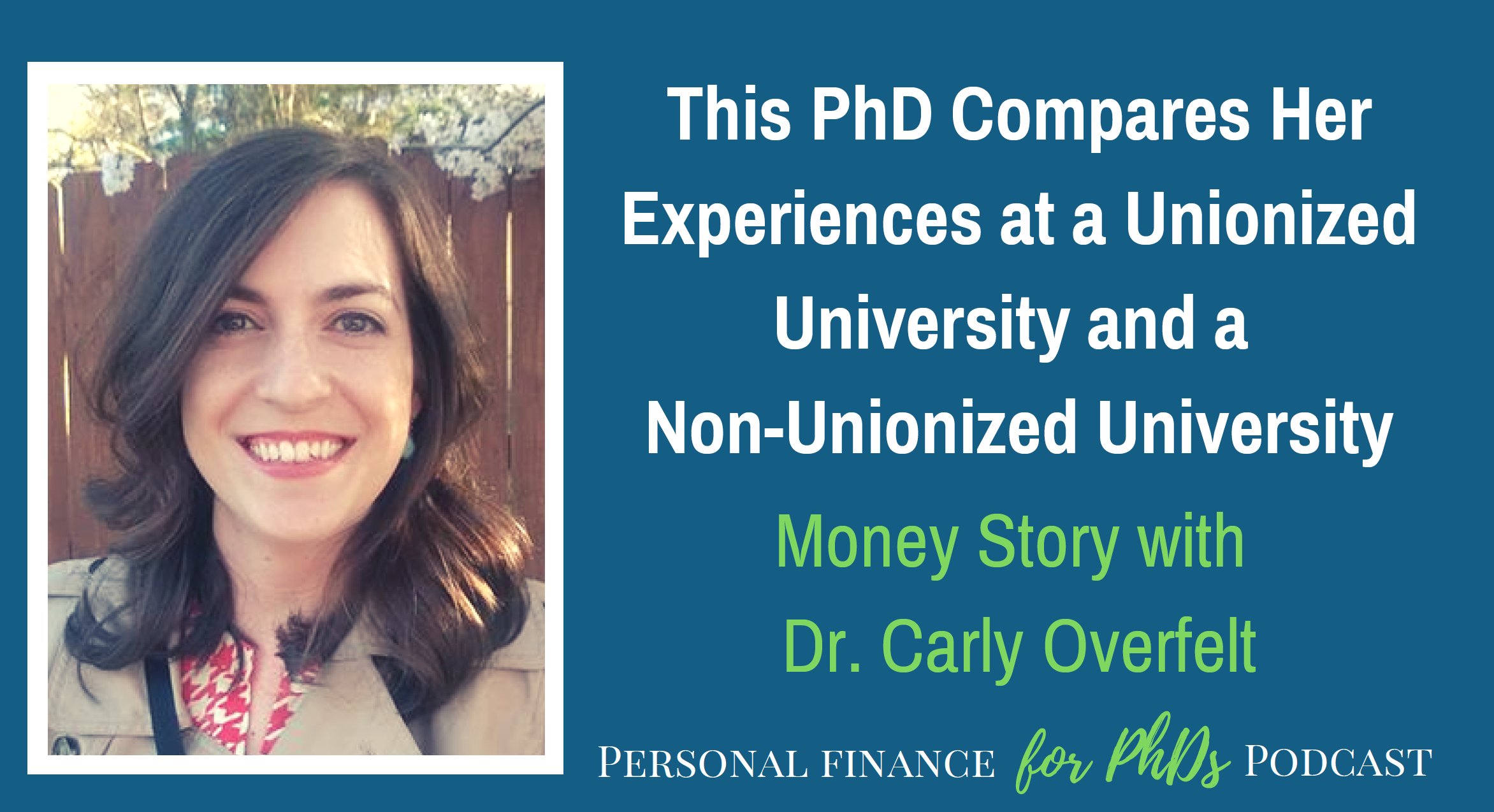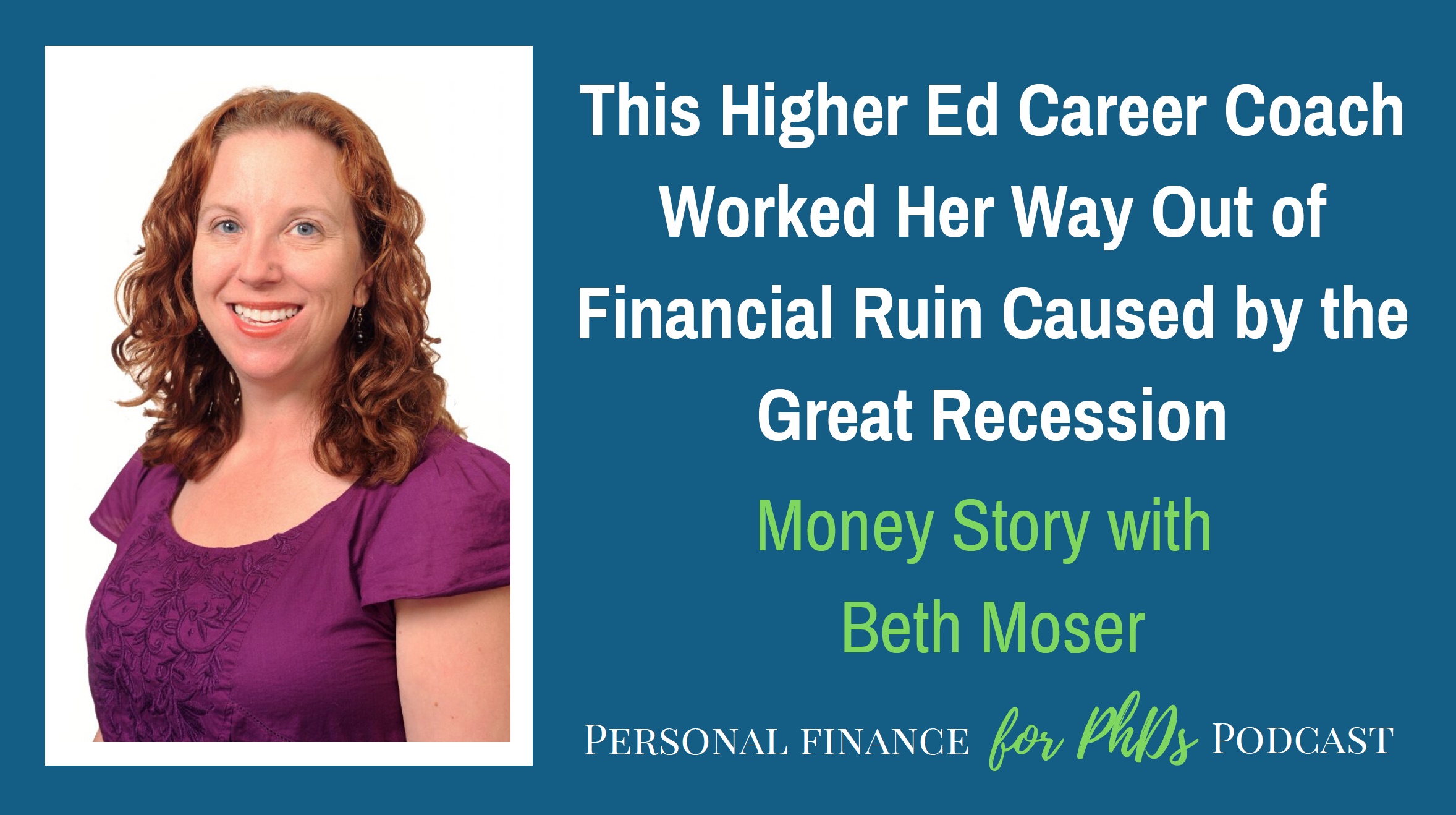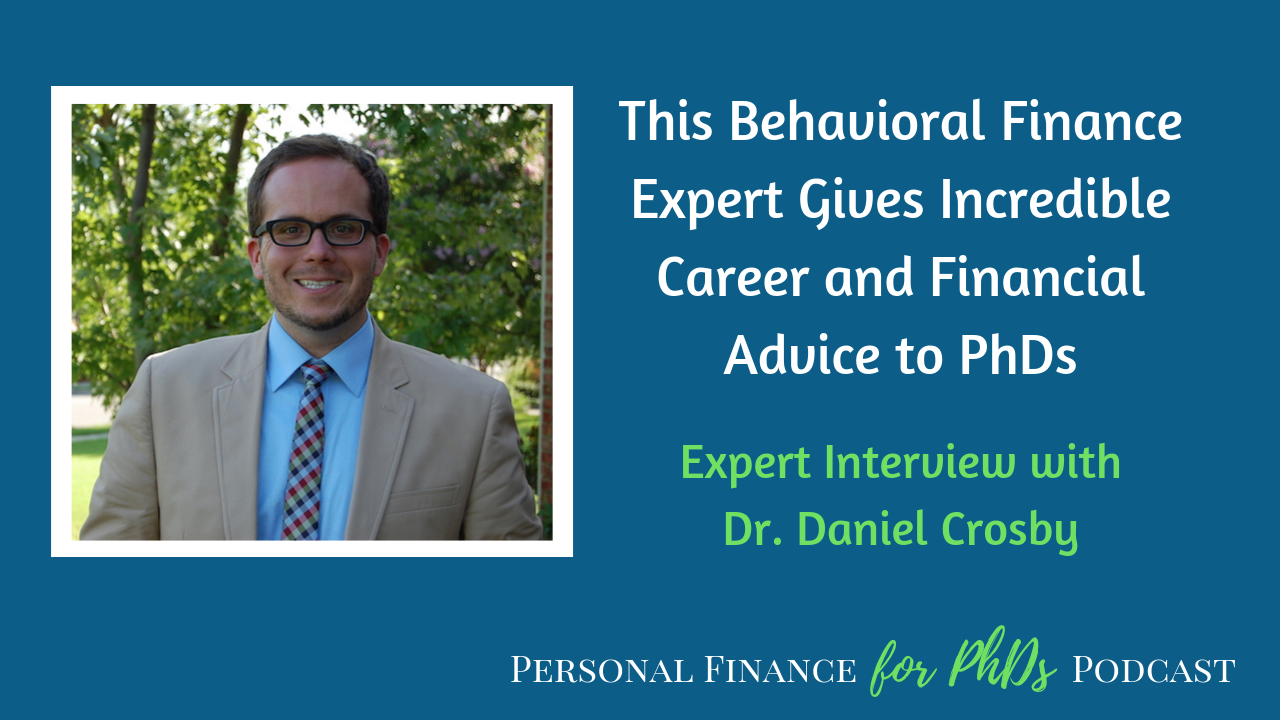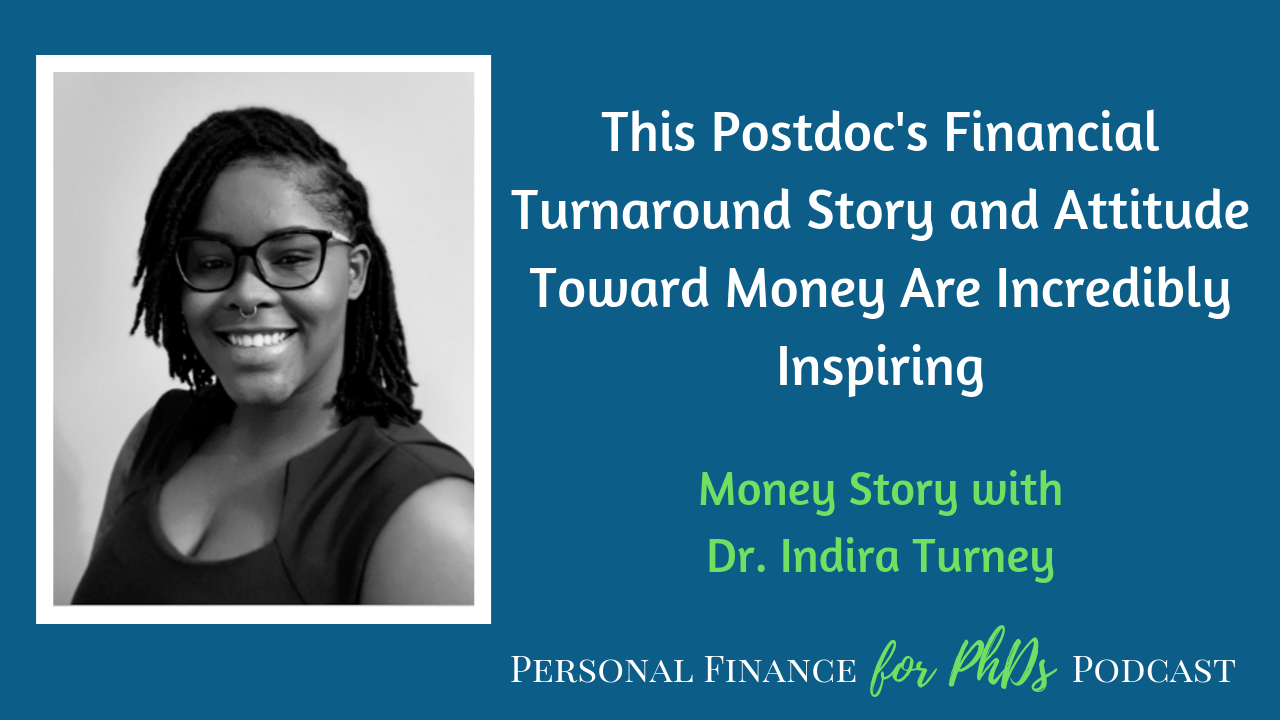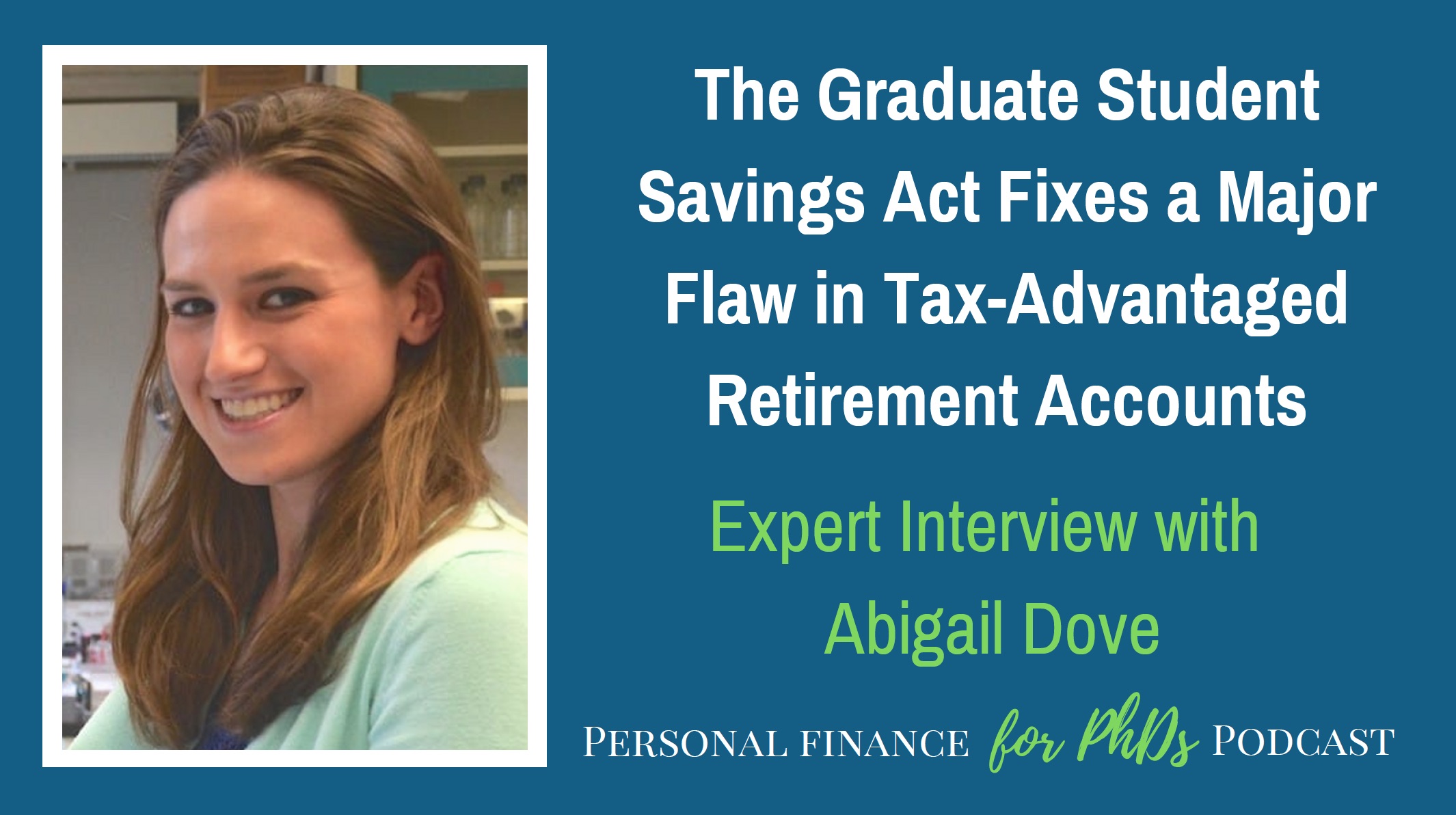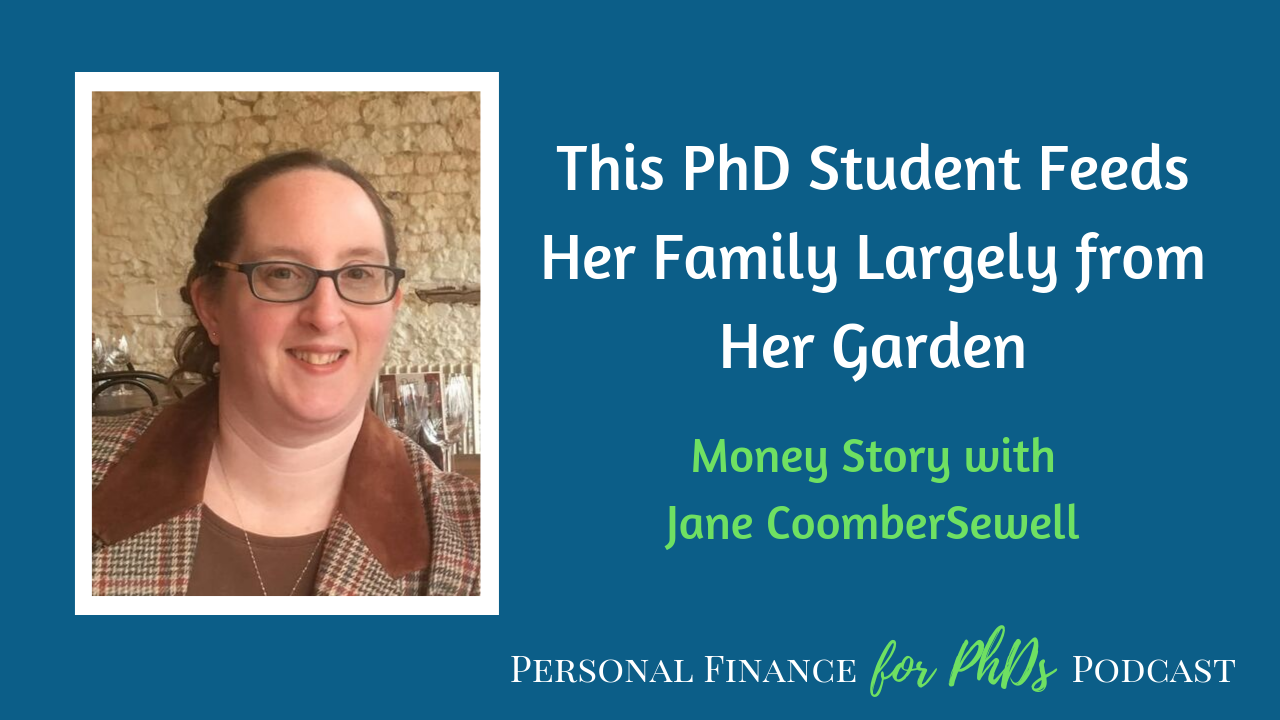In this episode, Emily interviews Dr. Carly Overfelt. Carly received a master’s from Purdue University, which does not have a graduate student union, and a PhD from the University of Massachusetts at Amherst, which has a longstanding graduate student union. Carly compares and contrasts her experiences as a graduate student worker at her two alma maters; she received higher pay and benefits at UMass. She shares the history of the graduate student union at UMass and the nature of her work within the union’s bargaining unit. At the end of the interview, we address the core questions around graduate student unions: Does the university view graduate students primarily as students or primarily as workers? Are graduate students paid well enough for their assistantship work to allow them to pursue their other job of completing their dissertation?
Links Mentioned in the Episode
- Personal Finance for PhDs: Personal Finance Coaching Sign-Up
- Personal Finance for PhDs: The Wealthy PhDs Group Program Sign-Up
- Personal Finance for PhDs: Podcast Hub
- Personal Finance for PhDs: Subscribe to Mailing List
Teaser
00:00 Carly: A lot of union work and bargaining is holding onto as much of what you already had as you can because unions are not as powerful as they used to be. And so, usually, when you’re bargaining, you’re trying to mitigate something disastrous that the management is doing. They’re usually slashing something, and you are using your collective power to mitigate that as much as possible.
Introduction
00:27 Emily: Welcome to the Personal Finance for PhDs podcast, a higher education in personal finance. I’m your host, Dr. Emily Roberts. This is season four, episode 14, and today my guest is Dr. Carly Overfelt. Carly received a masters from Purdue University, which does not have a graduate student union, and a PhD from the University of Massachusetts at Amherst, which has a longstanding graduate student union. Carly compares and contrasts her experiences as a graduate student worker at her two alma maters. She shares the history of the graduate student union at UMass and the nature of her work within the union’s bargaining unit. At the end of the interview, we get to the heart of the question around graduate student unions: Does your university support you in your dual roles as student and worker, or does one eclipse the other? Without further ado, here’s my interview with Dr. Carly Overfelt.
Will You Please Introduce Yourself Further?
01:24 Emily: I am delighted to have on the podcast with me today Dr. Carly Overfelt, and she is here to talk to us about being at two different universities during graduate school, one that didn’t have a union and one that did and the differences between those two experiences. So, Carly, thank you so much for joining me today, and will you please tell us a little bit more about yourself?
01:44 Carly: Yeah, thanks so much for having me. I’m Carly, and I started my graduate school journey at Purdue University where I did a master’s degree in linguistics and then a master’s degree in English. That took me about three and a half years, and then I started a PhD at the University of Massachusetts at Amherst. I finished my PhD in the spring of 2017. My interests were in linguistics and literature. I got interested in supporting linguistic diversity through my teaching. So, the position I have right now is at a small liberal arts college in Minnesota, and I’m kind of an adviser/tutor/instructor for our international students and domestic multilingual students. Yeah, it’s a great job.
Finances while at a Non-Unionized University
02:33 Emily: Very interesting. Yeah. Glad to hear that you’re enjoying that. So, let’s go back to your days at Purdue as a master’s student. So, what was the financial lay of the land at this non-unionized university?
02:48 Carly: Right. So, you know, since I had never been to a unionized university yet, I didn’t really have a comparison point, but I remember, you know, just like so many graduate students- broke all time, you know, my rent was almost 50% of my pay. Which I think is going to sound familiar to a lot of folks. That was the start of my expertise in the side hustle. In addition to teaching a few times a week and having meetings with students in office hours, I was also tutoring three nights a week for about $20 an hour cash. And so, I ended up spending so much of my time during the week on my side hustle that it was really hard for me to perform as well in my courses as I wanted to and to do the research that is necessary to do well. Right. So that was pretty tough.
03:42 Emily: Yeah. So it sounds like, were you a TA for the entirety of your time there? That was how you received your stipend?
03:50 Carly: I was. I was teaching a communications class for international graduate students, and the whole time I was there, I was teaching for that program. And sometimes there was a summer version of that that I could teach.
04:06 Emily: Yeah, it’s a little bit surprising to me, just given that Purdue is in a low cost of living area. I mean, we’re already hearing like, okay, you move from Purdue to UMass Amherst. I’d imagine there’s a big cost of living difference there. But even in Purdue, your stipend was only about twice what your rent was or maybe not even that much it sounds like.
04:24 Carly: Right, right. That’s right. And we did have health insurance benefits. Some of that came out of our paycheck, and they were fine. They weren’t as good as what I had through my parents before I started graduate school. But it was like, it was okay.
04:38 Emily: How about dental and vision?
04:41 Carly: Dental and vision was a little bit extra. And they would take that out of your paycheck as well. Some other things I want to note–and these were differences I didn’t notice as much until later–but we did not get paid through the holiday months. So, it was kind of several weeks that we were not getting paid. And we also had hefty fees through our program in the fall semester. And sometimes we would start getting bills for those before we had gotten a full paycheck through our teaching associateships. So, that was pretty tough.
05:16 Emily: Okay. So, you’re saying that your stipend was not a 12-month stipend, but it stopped over winter break and then what about the summer?
05:23 Carly: Right. So, it stopped over winter break, and it didn’t continue for the summer unless you were lucky enough to have a summer class assigned to you, and then it would pick up again in, say, like June.
05:36 Emily: And also, of course, the very common problem of paying fees one time per year or one time per semester. And it’s a real hit to the budget. That’s a really hard thing to cash flow on a grad student stipend. Yeah. OK. So not such a pretty picture.
05:51 Carly: No. Pretty tough.
05:52 Emily: Anything else you want to add to that?
05:54 Carly: No, I think that’s about it. That pretty much covers it.
Finances while at a Unionized University
05:57 Emily: Okay. And then when you moved on to UMass Amherst, you started realizing things didn’t have to be the way they were.
06:05 Carly: Right.
06:06 Emily: So, what was it like there?
06:09 Carly: I was very excited when I heard that they were unionized because I, you know, grew up in kind of a union household. My dad and stepdad both were kind of hardcore union. So, I was like, “Oh yeah, let’s do this!” But I didn’t realize how much it was going to change my financial picture until just like kind of living it. So, a few major differences right away. We were paid a lot more. Maybe not twice as much, but it was at least a 30% increase over–maybe 40% over–what I was being paid before. And that’s just wages, not talking about benefits. So that was noticeable. The fees were smaller, but also it was written into our contract that you could have that spread throughout and taken out of your paycheck, and we were paid through the holidays.
06:58 Emily: I really love the benefit of actually paying something with each paycheck. Because like, I mean fees–it kind of depends. They may be a reality or not, but just if you know what they are and they’re going to come at regular intervals, they are a lot easier to deal with. So, love that. And you said you were paid through holidays, and what about summer?
07:17 Carly: In the summer, it was kind of similar where if you were lucky enough to have a summer class assignment, which in my department was extremely rare, then you could be paid through the summers. So, I still had to, you know, work my side hustle skills, but at least I only had to do that in the summer. Sometimes I would do my side hustles during the week to just sort of help myself with the cushion for the summer. But to put that in perspective, I would do maybe one four-hour, you know, side gig shift per week to sort of just keep my relationship with that employer, and then work during the summer more hours for that kind of side hustle. So I actually was able to spend time on research and writing and conferences. I think I went to one conference the whole time I was at Purdue in terms of presenting, and then that switched to actually having the time to work towards that. And I was going to maybe two conferences per year when I was in my PhD program because I had time to do it. It was great.
What about Travel Funding and TA-ships?
08:20 Emily: Actually, I’m glad you brought up conference travel because that’s kind of another benefit that may or may not be in place. So it sounds like, because you weren’t side hustling so much, you had more time to go to conferences. Was there additional funding available for that sort of thing, or were you paying for that out of your own pocket?
08:34 Carly: I was usually paying for that out of my own pocket. There was a little bit more funding in that department, but it wasn’t part of the union contract bargaining. I think it was just a department that had different maybe funding priorities, you know, just generally for their graduate students. I don’t think I’m remembering this incorrectly, I think that was something that was just department-specific.
08:58 Emily: Gotcha. And were you also a TA throughout your PhD? Like that was your position every term?
09:05 Carly: I was. I was a TA, first teaching for the writing program, and then teaching for the English department, and getting my stipend through that and benefits which were very good and actually better than the benefits I have in my full-time alt-ac job right now.
09:24 Emily: What do you mean by that? What makes them better?
09:27 Carly: So, the deductible and coinsurance strategies that we usually get through our employer benefits. You know, when you lose the power of sort of negotiating for that and it just sort of gets handed to you from on high, it doesn’t take long to start seeing the differences in what are you going to pay in copay, what types of services are covered, and that kind of thing.
Paid Leave and Other Union Benefits at UMass Amherst
09:51 Emily: Gotcha. Let’s see, you talked about leave over the holidays, but–was built in the contract and maybe in contrast to when you were at Purdue–any like other kinds of paid leave? Or maybe you didn’t access this but you know about it, like maybe parental leave or short term disability leave, anything like that?
10:12 Carly: Yeah, there were different leaves that were available. There was even vacation in our contract. Of course, no one ever took it because you’re teaching, right? So, it was pretty rare for anyone to actually, you know, do that. But if you were savvy enough about your union contract, you kind of notice those things. Or if you were sort of touching base with your union reps enough to sort of learn about some of the more specific–because a lot of times, and this makes sense, a lot of times residents were thinking about the pay. That’s really the main thing that they’re concerned about. But there are sort of these other things that you learn about that you have those benefits. If you’re sort of plugged into the union a little bit more and reading their emails and doing all that–it takes a lot of time though. Right?
10:56 Carly: And you know, grad students are always very busy. So, you know, no shame for people who didn’t know about some of those details. But if you were plugged into it, there were different things. Some things that, you know, were negotiated in the contract were, like, paid parking. So, if you just want to park on campus as a grad student employee, everyone knows that can be very expensive. But the union had actually negotiated certain rates for graduate student employees to lower those costs. So, another benefit was, one of the bargaining years that I was there, the bargaining team negotiated access to all-gender restrooms where you’re working. So, in these huge campuses, right? You know, it’s not the same experience for everyone in every department, every building. And that’s something that you should be able to use the restroom and feel comfortable and safe. And that’s something that was actually written into the contract. So, that was a huge one.
11:53 Emily: Yeah, that’s super interesting. Yeah, interesting that we get down to that level of sort of granular detail, right? Like you were saying, it’s not just the pay. There are all these benefits and other working conditions that can be brought to the table. And like you were saying, I think something that is useful to think about is that when you have a union in place, it sort of brings all the disparate parts of the different departments–for example, like graduate students in different schools and different departments at the university–it brings them to the same like playing field and gets them all the same benefits. And it’s not like there’s going to be this level of pay and benefits over here and this over here. Is that correct?
Departmental Differences in Pay Rates and Raises
12:35 Carly: There was still some difference in pay. So, for example, I worked for the writing program my first few years and we had the lowest hourly pay. It was still way better than what I was getting at Purdue. I think it was something like $22 an hour when I started at UMass, but there was a minimum wage on campus for graduate student work, and we were making that minimum wage. So, if you’re coming from a different department that’s more well-resourced or you know, maybe use this recruiting tool, then you may get paid more. My husband was in the linguistics department and he got paid more than me, and I just was always annoyed about that.
13:15 Emily: So, the union helped establish the minimum wage across the university, which your department said, “Yup, that’s what we pay.” Did the union also negotiate the pay rates at other departments? Or is that just the department saying, “Okay, we see the minimum, but we’re going to be paying more than that?”
13:33 Carly: I think that that’s what other departments would do. I can’t speak specifically to that, but I think that that’s how the disparities–and you know, when I say disparity, it was pretty minimal. It wasn’t a huge difference among the departments–but there was a difference. So that was sometimes annoying to me. But yeah, when they would negotiate raises, it was like a general raise. And so, how that might work out in particular departments might vary.
Additional Experiences with the Union
13:59 Emily: I see. So, aside from just being a student at the university, did you have experience with the union as not just a student?
14:10 Carly: I did. You know, I was already sort of interested in unions and so I was a steward at first, which means that you maybe come with someone to a meeting with their supervisor that they think might be a little bit tricky, and you come and you’re sort of a support person for them. And then I was in the leadership for the graduate student bargaining unit part of our union, because we were part of a–and some people who don’t know, there’s usually a much bigger organization like the United Auto Workers was ours. And then the graduate students at UMass were one shop as they say, one workplace, in that. So, I was in the leadership of that. And then I kind of just kept getting more involved and I volunteered on the joint council, which is where all of the shops, the workplaces, kind of have representation. And then eventually I was on the executive board as the secretary and that’s where you have like the president of the union and this would be over the entire union for us. It was UAW 2322. And so we had, I think there at the end about like 3000 members. So, there was a lot of opportunity to be involved and to meet different people. And so that was an interesting perspective.
15:21 Emily: Yeah. What an interesting opportunity for, maybe not work experience, but volunteer experience that is very professional as part of your graduate experience. Like, yeah.
15:33 Carly: Yeah. I have used a lot of that experience in, you know, my work even now working on committees with people who have extremely different backgrounds than myself. Just collaborating towards a common goal. Most of everything that I did was volunteer-based, but something that people don’t know sometimes is that, if your graduate students are unionized, sometimes there are paid positions within that shop, so to speak. That is a fellowship or assistantship that comes with the pay and benefits, you know, that we’re talking about. So, sometimes people would step into one of those roles out of their teaching fellowship and do one of those leadership roles for a year and then step back into the funding stream of their department, which was really great to have that kind of opportunity.
16:20 Emily: Yeah, that’s kind of some more jobs to go around. I guess.
16:23 Carly: That’s right.
Commercial
16:27 Emily: Emily here for a brief interlude. As a listener of this podcast, every week you hear strategies that another PhD has used to improve their financial picture. But listening and learning does not automatically translate into action in your own financial life. If you are ready to change how you think about and handle your money but need some help getting started, I can be of service. There are two main ways you can work with me to create and implement a financial plan tailored for you. First, I offer one-on-one financial coaching, either as a single session or a series as you make changes over the long-term. You can find out more at pfforphds.com/coaching. Second, I offer a group program called The Wealthy PhD that is part-coaching, part-course, and part-community. You can find out more and join the waitlist for the next time I open the program at pfforphds.com/wealthyPhD. I believe it’s possible to succeed with your finances at every stage of PhD training and throughout your career. Let’s figure out together how to make that happen for you. Now, back to the interview.
History of the UMass Amherst Union
17:41 Emily: So, you kind of talked about what your experience was again as a student at UMass. When was the union at UMass Amherst established?
17:50 Carly: This was established in the 1990s, so by the time I was there, it was a really longstanding, well-established union, sometimes even seen as a model for organizing in other places. Around the time I was there, the University of Connecticut organized as well. And so, yeah, there wasn’t a lot of memory of what that was like at first, although I think it was kind of tense, and I believe that the students did go on strike to help create that union. When I was there, when we would bargain every maybe two or three years–I think that’s right–it could get a little bit tense with the relationship in terms of like the bargaining team and the administration. But other than that, usually it was pretty calm. A lot of people didn’t know that we were unionized, which was kind of interesting and a little discouraging. If you’re involved in the union, you’re like, “Hey, you know, this is like this really great thing that’s happening here.” But yeah, so it was interesting.
18:52 Emily: So, while you were in graduate school, it sounds like since there were contracts being renegotiated every two or three years, did you see any changes year over year to those contracts?
19:06 Carly: For sure. So, we always would bargain–I’m now using the word “we” to just being “we the union,” I wasn’t on the bargaining team–but we always negotiated for higher wages. So, it was usually between a 2-3% raise. I’d want people to know that when you’re talking about one and 2%, you’re usually just keeping up with the cost of living. So, we get excited when it’s 2-3%, right? And you’re just getting a little bit higher than that.
19:33 Emily: Is that 2-3% over the two-to-three-year period or is that every year within that period?
19:40 Carly: Yeah, so because it was usually stepped up. So, maybe it would be 1% for the first year and then 2% for the second year, or something like that. And so, you would see gains over cost of living, I guess, is the important point. You know, one thing that people don’t think about sometimes is that if you’re not getting a raise that at least equals cost of living, your employer is paying you less money for the same work. And that’s one of the benefits of the union experience. You start to think in those terms a little bit, which everyone benefits when they’re kind of thinking about that for themselves. I guess the major point I want to make is that it was over the cost of living.
How About Changes in Fees?
20:21 Emily: Yeah. How about the fees? Because I mean, you said already that the fees were at least set up so that you could pay them with each paycheck. But something I’ve seen at other universities is, not only is the pay stagnant, but the fees are increased. The out-of-pocket fees are increasing. Did you see any changes to that fee structure while you were there?
20:43 Carly: I think our fee structure stayed about the same. I don’t remember any major changes with the fees. So, that’s not one thing, but maybe a different example of a gain would be the health insurance difference. So actually, and this is sort of a larger context and other union leaders that you interview can probably corroborate this, but a lot of union work and bargaining is holding onto as much of what you already had as you can because unions are not as powerful as they used to be. And so, usually when you’re bargaining, you’re trying to mitigate something disastrous that the management is doing. They’re usually slashing something and you are using your collective power to mitigate that as much as possible. That’s going to sound really cynical to some folks, but when we’re talking about the benefits side of things, it just is true.
21:33 Carly: So, for example, the insurance turned into kind of a co-insurance the first year I started. So, I don’t remember what it was exactly the year before I started, but I remember that they upped it to like a $5,000 deductible, which was a huge difference from before. And the union over time and a lot of effort was able to cut that to $2,500. That’s half. Right? Still wasn’t as good as it was before, but with the rising costs of health insurance and just unions just being what they are in the U.S. right now, that was what they were kind of able to do. You wouldn’t feel that difference if you don’t have like a major accident or a chronic illness, but for people who are experiencing that, it was a major difference for them.
Any Downsides or Tradeoffs with the Union?
22:20 Emily: Yeah. I appreciate you making the point about it’s not necessarily about seeing gains, like while again just a beneficiary of the contract, but rather you don’t know behind the scenes what is being pushed back against, you know, what changes might have been had there not been some bargaining power there on behalf of the student workers. Were there any downsides or tradeoffs you would say for the union being in place at UMass Amherst?
22:50 Carly: Right. So really the major thing is that you’re going to pay union dues, and depending on what state you live in, that might look different. So when I was at UMass, it was 2% which is something like two hours worth of labor, I think is the way that they figure that. And so there was the option to be an agency fee payer and now we’re kind of getting into the legislation around union membership and that kind of thing. And if you didn’t want to pay the 2%, and you could be an agency fee payer and pay 1.7% because of the laws in effect in Massachusetts at that time. Somewhere like Indiana, you could get away with paying zero, but you’re still covered because you’re in the bargaining unit. You still get all those benefits, anything that they bargain you get. If something terrible happens in your workplace, like you’re sexually harassed, the union is behind you 100% and they do all of the things that they would do for anyone else.
23:48 Carly: But then you’re either not paying the dues, somewhere like Indiana, or you’re paying a smaller amount. And so at UMass Amherst it was 1.7 or 2%. You’d be surprised how many people chose the 1.7. And I understand that because people are thinking, I want as much of my paycheck as possible. But you know, from my perspective it’s like, “Pay the 2% and be a voting member.” That’s kind of changing. There are some changes with legislation around that. I’m actually not sure how long Massachusetts will be able to do that. I think they’re about to go to a system where they can’t require that 1.7% anymore. But so, right. Paying dues. Something that people think about is a potential trade-off would be maybe the attitudes on campus around the union. Do we have an adversarial kind of relationship with the university? And that kind of thing.
24:40 Carly: And not really, I mean, if you’re on the bargaining committee, it could get kind of tense with the administration during that time, as I said before. But being part of the union or being a union member from my experience, didn’t make like my advisor feel differently about me. It didn’t make me seem like a troublemaker, you know. It was just, it was kind of normal because the union had been there so long. If I had been there during like the initial fight, I guess you could say it might be different.
Other Union Groups on Campus
25:09 Emily: Yeah, I can definitely see how that could be the case. But with a union in place for decades, it’s just kind of part of the landscape now. Were there any other union groups on campus? Like adjuncts or faculty or postdocs or staff members, anything like that?
25:23 Carly: Yes. So the postdocs were in the same union with us. They were a different shop, but within the same union. And they were you know, maybe like less active because they were usually on campus for maybe one or two years. The faculty were also unionized, but they were in a different union. The staff were unionized and they were in a different union. And then also I think Massachusetts at that time had legislation where any contract work that they did on campus, like construction, etc., they had to hire union workers or at least there were some incentives to doing that. So, If we marched around with signs about something like the co-insurance issue, we had support from all different directions. And sometimes we would have events and actions, you know, together. But I remember specifically one time marching across campus with a sign and the guys over here on the forklift doing whatever they’re doing construction-wise, like kind of honking and supporting us. So, it was kind of a cool way of being part of a community on your campus as well.
26:24 Emily: I’m really glad to get this picture of an established union for the graduate students and postdocs–or postdocs separately, different shop–but then also just pretty much most people on campus, right? Being part of one union or another. So it’s a very normalized part of the culture. So this is a very, I guess maybe could say like quiescent situation. Like, it’s just this is how things are at that university. So we may hear in other interviews I do in the next few months from some different situations where unionization is a newer concept or maybe only the graduate students are unionized, not other people.
26:56 Carly: Right.
Anything Else About Your Union Experience?
26:56 Emily: I don’t know. So it’s really interesting. I’m really glad to have your perspective there. So, anything else you want to add on this before we wrap up?
27:03 Carly: You know, I would say, just looking back on my time at Purdue, I remember that they made a change with our health insurance benefits once where suddenly like birth control was not going to be covered at all whatsoever. It didn’t matter what your doctor said, if you needed it to live, it doesn’t matter. Right. And I remember being really angry about that and not feeling like I could do anything. If that had happened at UMass Amherst, hell no. That would not have gone without a fight and it probably would have eventually gotten into the contract that that has to be covered. And it was covered. That kind of thing was covered through our insurance. So, you know, just looking back, you think a lot differently, and I feel really grateful that I was part of that and I was actually able to do research and writing, which is what you’re there to do. So, it was great.
27:48 Emily: Yeah. It sounds like your experience at Purdue, versus at UMass, that you were much more supported as like a well-rounded student, I guess you could say. Which is kind of a funny thing to say when we’re talking about unions because we’re really focused on employees, right? Like the important part is that you were an employee of the university and therefore were part of this bargaining unit and so forth. But what I’m thinking of is that you really were supported more as a whole student rather than at Purdue, it sounds like you were treated like you’re a TA. In terms of the relationship between the university and you, that’s what they cared about. You’re serving as a TA, that’s what you’re being paid for, et cetera. Maybe you had other types of relationships with other people there, but in terms of the administration, they saw you as a worker who was just there to perform some task.
Grad Students: When are you Working versus Studying?
28:41 Carly: I see your intuition, totally, but it’s almost the opposite. And let me kind of explain that. So, at Purdue, if there was pushback about something like pay, et cetera, the rationale that the university would give is this is your stipend, this isn’t wages. You’re a student and this is a stipend that you get. Because if they thought about us as workers, then they would have to reckon with what are we getting paid hourly, right? What does that calculate to? And that was some of the rationale against some agitation to unionize while I was there. Actually there was some movement towards that, which is a whole other story. But yeah, that was usually their argument if someone had to complain about something. At UMass, they saw us as workers more than at Purdue, and we benefited from that.
29:31 Carly: But sometimes there was still a little bit of that. If there was something that someone’s complaining about, if they could benefit by seeing you as a student for these purposes and as a worker for these purposes and they could work the system to sort of benefit in certain ways. And usually when we insisted on being seen as workers, that’s when we would usually do the best. So, it’s kind of interesting that you say that because it kind of gets us into the heart of that question is like, when are you working and when are you studying? And I would argue that you really have two jobs. One is the thing that you’re getting your pay and benefits for, and the other thing is your research and writing and thinking. And that’s also your job.
30:09 Carly: And so, if you’re at a place where you’re unionized, you can do both of those jobs. If you’re at a place that isn’t, you may find that you’re only doing one of your jobs because the rest of your time is your side hustle to try to kind of make up for the pace. So, that’s kind of a long-winded way of saying that you’re really hitting at the heart of the question, which is when are you a student? When are you a worker, and why does that matter? What are the implications for that?
30:31 Emily: I’m so glad that we got to that additional level of insight on this. I guess that I was thinking more so, and you brought this up too, is like that the university maybe in a nonunion situation sees that their graduate students are both employees and students, and they’re going to do whatever’s best for them in terms of, do I want to treat you more as a student? Do you want to treat you more as an employee? Well, we’re just going to do whatever is in our best interest. The dual relationship in that case can work against the student worker. Whereas, it sounds like what you’re saying, at least in the case when you have unionized in terms of your work, that is more protected, and then you as an individual can have that protected part of your compensation, your benefits and so forth, be able to enable you to do the other part of your job as you said, which is actually what you’re in grad school to do, like kind of scholarship and your own professional development. Does that sound right?
31:31 Carly: Yep, absolutely.
Financial Advice for Early-Career PhDs
31:32 Emily: Okay. I’m so glad we got there, and so last question as we wrap up, Carly, which is just what I like to ask everyone. What is your best financial advice for another early-career PhD?
31:43 Carly: I would say, and this is right from what we were just talking about, which is what you’re doing is work, and it’s labor. And don’t forget that, and think about what it’s worth. And when you’re doing things, think about how is that coming back to you in terms of hourly work. So, thinking about how much time you’re spending on different components of your teaching and your research and your writing, and how is that coming back to you and what’s it worth to you? Sometimes people say don’t do anything for free. Maybe sometimes, but like know what you gave away, right? Know what was the value of that. And it has really helped me think about like my career steps afterwards and thinking about what I’m worth and what I want. So yeah, what you’re doing is work. It is.
32:32 Emily: Well, thank you so much for this interview, Carly. I really enjoyed speaking with you about this really sort of topical and timely issue in getting your perspective from those two different institutions you’ve been part of. So thank you.
32:46 Carly: Yeah. Thank you so much for having me. It’s been a pleasure.
Outtro
32:49 Emily: Well, listeners, thank you for joining me for this episode. Pfforphds.com/podcast is the hub for the Personal Finance for PhDs podcast. There, you can find links to all the episode show notes and a form to volunteer to be interviewed. I’d love for you to check it out and get more involved. If you’ve been enjoying the podcast, here are four ways you can help it grow. One, subscribe to the podcast and rate and review it on Apple podcast, Stitcher, or whatever platform you use. Two, share an episode you found particularly valuable on social media or with your PhD peers. Three, recommend me as a speaker to your university or association. My seminars cover the personal finance topics PhDs are most interested in like investing, debt repayment, and taxes. Four, subscribe to my mailing list at pfforphds.com/subscribe. Through that list, you’ll keep up with all the new content and special opportunities for Personal Finance for PhDs. See you in the next episode! And remember, you don’t have to have a PhD to succeed with personal finance, but it helps. The music is Stages of Awakening by Podington Bear from the free music archive and is shared under CC by NC. Podcast editing and show notes creation by Meryem Ok.
